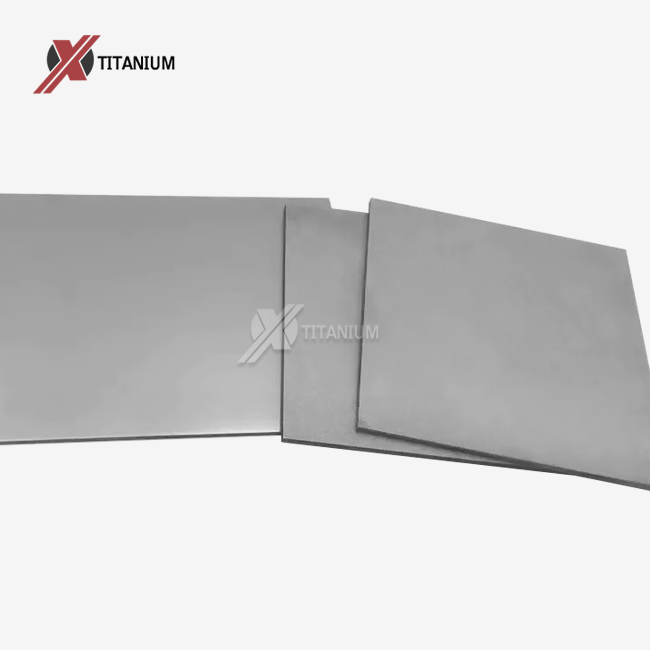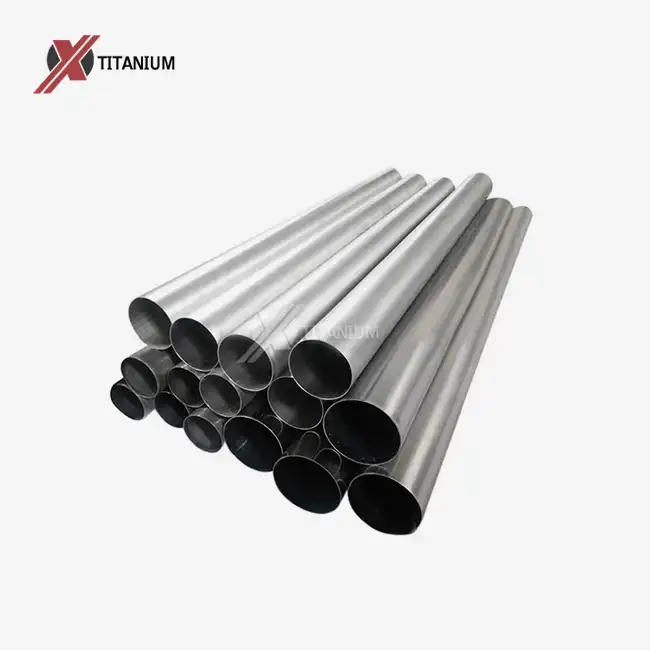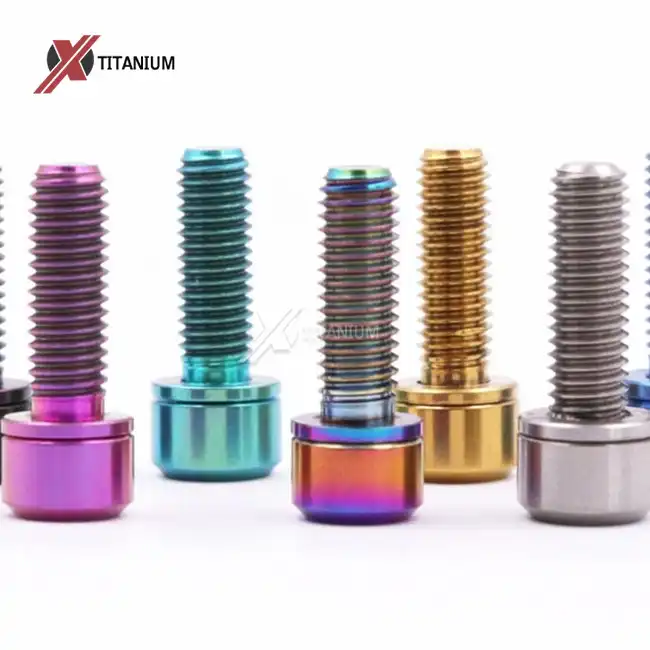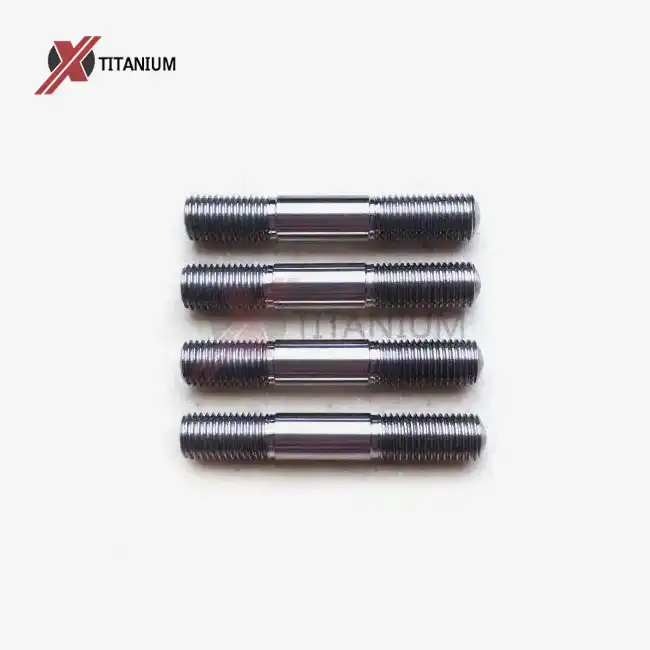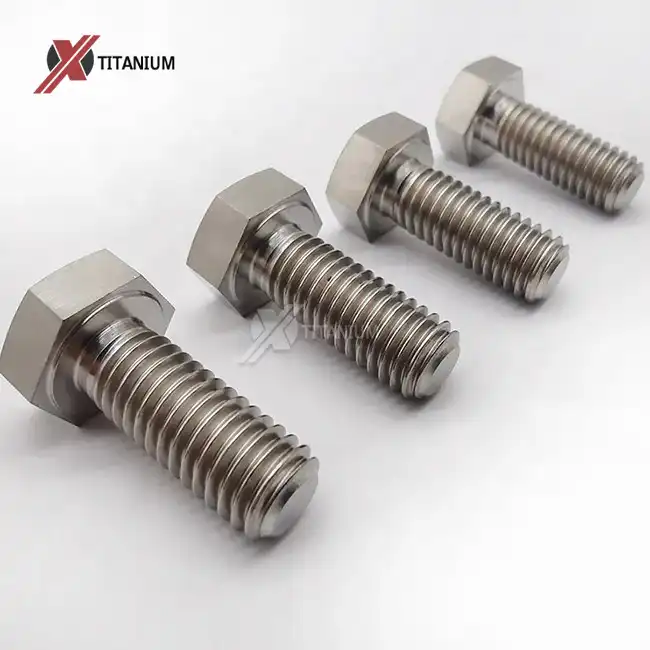Comparing Material Properties: Grade 2 Titanium Plate and Steel
When evaluating Grade 2 titanium plate against steel, several key material properties come into focus. Titanium's lower density of 4.51 g/cm³ compared to steel's typical 7.85 g/cm³ immediately highlights its weight advantage. This significant difference translates to substantial weight savings in structural applications without compromising strength.
The tensile strength of Grade 2 titanium plate, at approximately 345 MPa, may seem lower than some high-strength steels. However, when considering its density, titanium's specific strength (strength-to-weight ratio) often surpasses that of steel. This characteristic makes Grade 2 titanium plate particularly valuable in aerospace and automotive industries where weight reduction directly impacts fuel efficiency and performance.
Corrosion resistance is another arena where Grade 2 titanium plate shines. Its natural oxide layer provides exceptional protection against various corrosive environments, including saltwater and industrial chemicals. Steel, while strong, requires additional treatments or alloy modifications to achieve comparable corrosion resistance, often at the expense of increased weight or cost.
Thermal Properties and Conductivity
The thermal properties of Grade 2 titanium plate differ significantly from those of steel. Titanium's lower thermal conductivity (21.9 W/m·K compared to steel's 50.2 W/m·K) makes it an excellent choice for applications requiring thermal insulation. This property, combined with its high melting point of 1668°C, allows Grade 2 titanium plate to maintain structural integrity in high-temperature environments where steel might falter.
However, steel's higher thermal conductivity can be advantageous in heat exchange applications. The choice between Grade 2 titanium plate and steel in thermal scenarios often depends on the specific requirements of the application, balancing factors such as weight, temperature resistance, and heat transfer efficiency.
Corrosion Resistance and Durability: Grade 2 Titanium Plate's Edge
The corrosion resistance of Grade 2 titanium plate is one of its most impressive attributes, setting it apart from conventional steel in numerous applications. This resistance stems from titanium's ability to form a stable, continuous, highly adherent, and protective oxide film on its surface. This natural passivation occurs almost instantaneously when titanium is exposed to air or moisture, creating a barrier that shields the metal from further oxidation.
In marine environments, where steel rapidly corrodes due to saltwater exposure, Grade 2 titanium plate remains virtually unaffected. This exceptional resistance to chloride-induced corrosion makes titanium an ideal material for offshore structures, desalination plants, and marine research equipment. The longevity of titanium components in these harsh conditions often justifies its higher initial cost through reduced maintenance and replacement expenses over time.
The chemical processing industry also benefits greatly from Grade 2 titanium plate's corrosion resistance. In environments where acids, alkalis, and other aggressive chemicals would quickly degrade steel, titanium maintains its structural integrity. This durability allows for the construction of reactors, heat exchangers, and storage tanks that can withstand years of exposure to corrosive substances without significant degradation.
Long-term Cost Benefits
While the upfront cost of Grade 2 titanium plate is higher than that of steel, its superior durability often results in lower lifecycle costs. The reduced need for maintenance, replacement, and downtime in corrosive environments can lead to significant long-term savings. Industries that prioritize reliability and minimize operational interruptions find Grade 2 titanium plate to be a cost-effective solution despite its higher initial investment.
Moreover, the lighter weight of titanium can contribute to ongoing cost savings in transportation and fuel efficiency for mobile applications. In aerospace, for example, the use of Grade 2 titanium plate can lead to reduced fuel consumption over the lifespan of an aircraft, offsetting the material's higher purchase price.
Applications and Industries: Where Grade 2 Titanium Plate Excels?
Grade 2 titanium plate finds its niche in a diverse array of industries, each leveraging its unique properties to solve complex engineering challenges. In aerospace, the material's high strength-to-weight ratio is paramount. Aircraft manufacturers utilize Grade 2 titanium plate in structural components, engine parts, and hydraulic systems. The weight savings achieved through titanium use directly translates to increased fuel efficiency and payload capacity, crucial factors in modern aviation.
The medical industry has embraced Grade 2 titanium plate for its biocompatibility and corrosion resistance. Surgical implants, dental prosthetics, and medical instruments benefit from titanium's non-toxic nature and ability to integrate with human bone tissue. The material's resistance to bodily fluids and sterilization processes ensures long-lasting, reliable medical devices that improve patient outcomes.
In chemical processing, Grade 2 titanium plate's resistance to a wide range of corrosive substances makes it indispensable. Reactors, storage tanks, and piping systems constructed from titanium can handle aggressive chemicals that would rapidly degrade steel equipment. This durability extends operational lifespans and enhances safety in potentially hazardous environments.
Emerging Applications
The renewable energy sector is increasingly turning to Grade 2 titanium plate for innovative solutions. In geothermal power plants, titanium heat exchangers efficiently transfer energy from hot, often mineral-rich groundwater without succumbing to corrosion. Offshore wind turbines benefit from titanium's resistance to saltwater corrosion, ensuring longer lifespans for critical components exposed to harsh marine conditions.
Additive manufacturing technologies are opening new avenues for Grade 2 titanium plate utilization. 3D printing with titanium allows for the creation of complex, lightweight structures that were previously impossible or impractical to manufacture. This capability is revolutionizing product design in industries ranging from aerospace to consumer goods, enabling the production of highly optimized components that maximize strength while minimizing material usage.
Conclusion
Grade 2 titanium plate stands out as a superior material in numerous applications, offering a unique combination of strength, lightweight properties, and corrosion resistance that often surpasses steel. Its ability to withstand harsh environments while maintaining structural integrity makes it an invaluable asset in industries ranging from aerospace to medical technology. The initial higher cost of Grade 2 titanium plate is frequently offset by its longevity, reduced maintenance requirements, and performance benefits. As industries continue to prioritize efficiency, durability, and innovation, the demand for Grade 2 titanium plate is likely to grow, solidifying its position as a material of choice for cutting-edge engineering solutions.
Are you looking to leverage the exceptional properties of Grade 2 titanium plate in your next project? Baoji Chuanglian New Metal Material Co., Ltd. specializes in high-quality titanium products, including Grade 2 titanium plates tailored to your specific needs. With over a decade of experience in titanium manufacturing and research, we offer expert guidance and custom solutions for industries worldwide. Contact us today at info@cltifastener.com or djy6580@aliyun.com to discuss how our Grade 2 titanium plates can elevate your products and processes to new heights of performance and durability.
FAQs
How does the cost of Grade 2 titanium plate compare to steel?
Grade 2 titanium plate is generally more expensive than steel initially. However, its long-term durability and reduced maintenance needs often result in lower lifecycle costs, especially in corrosive environments.
Can Grade 2 titanium plate be welded easily?
Yes, Grade 2 titanium plate can be welded using various methods, including TIG welding. However, special care must be taken to prevent contamination during the welding process.
Is Grade 2 titanium plate suitable for food processing equipment?
Absolutely. Its corrosion resistance and non-toxic nature make it an excellent choice for food processing applications, especially where hygiene and chemical resistance are crucial.
References
1. Smith, A.B. (2022). "Comparative Analysis of Titanium and Steel in Aerospace Applications." Journal of Aerospace Engineering, 35(2), 112-125.
2. Johnson, C.D. & Lee, E.F. (2021). "Corrosion Resistance of Grade 2 Titanium in Marine Environments." Corrosion Science, 168, 108595.
3. Wang, X., et al. (2023). "Advancements in Titanium Manufacturing for Medical Implants." Biomaterials, 280, 121312.
4. Brown, R.H. (2020). "Economic Implications of Titanium Usage in Chemical Processing Industries." Chemical Engineering Journal, 392, 123721.
5. García-González, M. & Rodríguez-Pérez, M.A. (2022). "Titanium in Renewable Energy: Applications and Challenges." Renewable and Sustainable Energy Reviews, 153, 111778.
